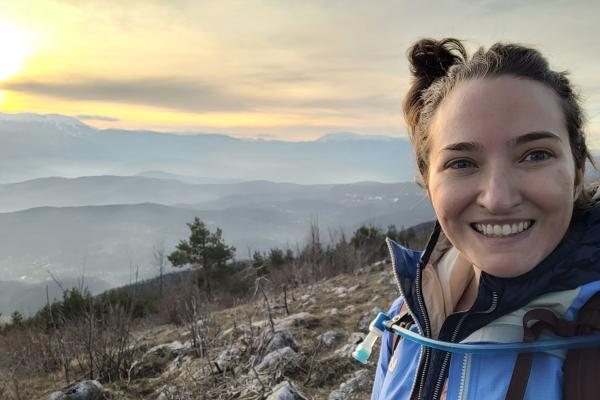April 2022 CSEEES FLAS Alumni Profile: Robin Smith

Robin Smith, BA in Political Science and Russian, Class of 2017
2014-15 Academic Year FLAS Fellowship Recipient for Advanced Russian
Where do you work and what is your current position?
I am a disaster behavioral health first responder. I recently returned from Poland where my colleagues and I trained 500+ Polish and Ukrainian students, professors, teachers, and community members in Lublin and Warsaw. We taught Health Support Team, an evidence-based disaster behavioral health protocol, and STRONG, an school based intervention for newcomer students.
Since the war started, I have been providing psychological services for current FLEX students and am training FLEX alums in Central Asia and NSLI-Y alums in Health Support Team. I am very honored to work with such incredible students.
When I’m not deployed, I work as a pediatric mental health therapist at a Dialectical Behavior Therapy clinic. I use evidence-based interventions to treat children and teens experiencing anxiety, mood, and eating disorders.
Tell us how you got there.
I think the best way to describe it is a new word I recently learned in Bosnian-Croatian-Serbian: nafaka. Blind luck or судьба, fate, I guess!
I tried several different jobs after graduating from Ohio State in a variety of sectors: teaching, government, international education, and then eventually, decided to complete my MA in child psychology and a certificate in International Humanitarian Response. I never would have expected my disparate skills and experiences to be mobilized at the same time due to a war in a part of the world I love.
How has your degree from Ohio State and/or the FLAS program impacted your career?
The connections I made, cultural knowledge I gained, and language skills I practiced through OSU’s Slavic Department and through my FLAS Fellowship are what has made it possible for me to be a first responder to the war.
Additionally, without OSU and FLAS connections, Health Support Team would not have Polish, Ukrainian, and Russian translations of our training materials. These materials are reaching hundreds, if not thousands, of Polish and Ukrainian volunteers.
Finally, my experience at OSU and on FLAS have given me the background to provide culturally nuanced care for FLEX and NSLI-Y students, as well as for my patients from Eastern Europe and the former USSR.
What was your focus or research interest when you studied at OSU?
I majored in Russian, Political Science (Comparative), and minored in Clinical Psychology. While at OSU my research interests were Tatarstan, Central Asia, ethnic politics, and public diplomacy.
If you are a traveler, what is one of your favorite trips you have taken?
A few months ago I traveled to Bosnia for the first time with a Russian friend. We hadn’t seen each other in seven years! We enjoyed road tripping throughout the country – we drove all the way to the tiny strip of Bosnian beach in Neum – learning the history of Sarajevo, and trying to find the commonalities with Russian and BCS. Reflecting on having been there, especially with my Russian friend, gives me some solace in the possibility that wars end, people are resilient.
What are your future plans?
I worked in Bishkek, Kyrgyzstan doing FLEX recruiting last year. I would love to someday return to Bishkek to do research and development of a school-based mental health curriculum for adolescents. For now, though, I will continue my work in Poland as long as needed.
What inspires you?
I am inspired by the FLEX students I work with. I deeply believe in the program’s mission, and I really admire the students’ curiosity, tenacity, and generous efforts to share what they learn in the US with others in their country of origin.
I am also always inspired by my patients. I think often they don’t give themselves enough credit for how resilient they are!
If you work in the non-profit, government, or private sector, what advice would you give to students considering jobs in those sectors?
I would recommend apply to what sounds interesting to you (and hopefully that also pays the bills) and see if you like it. If you end up not liking it, try something new! The learning you get by trying it out for yourself is probably better than any other advice I could give you.
